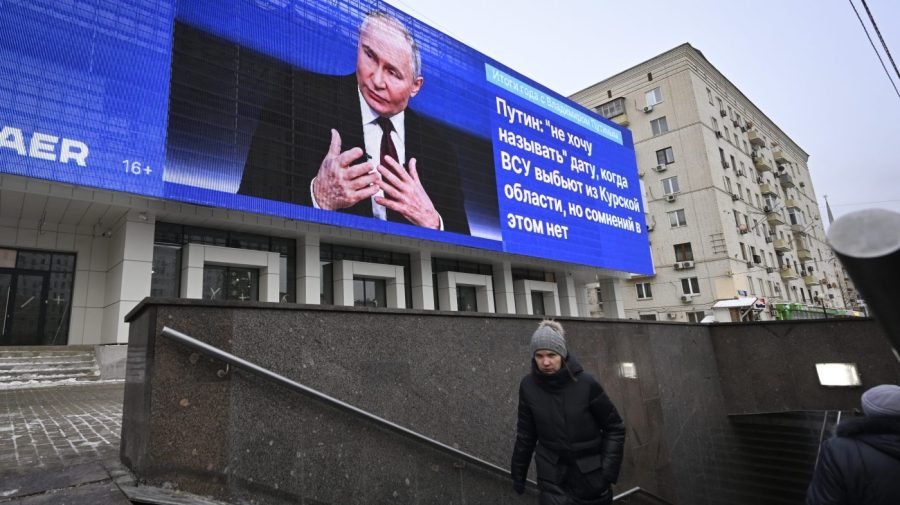
What a difference a regime collapse can make!
Now that the regime of Bashar Assad has fallen, analysts and policymakers are discovering that the Syrian dictator’s friend and protector, Russia’s Vladimir Putin, may also be vulnerable.
Fareed Zakaria captures this mood-swing well, writing, “Putin’s Russia now resembles the Soviet Union in the 1970s. While it is still assertive and interventionist abroad, its economy at home is increasingly weak and distorted by its conversion into a wartime operation. But just as the external expansionism and internal mobilization could not mask Soviet decay forever, so today Putin’s bravado should not scare us. Think about it: If Russia were winning in Ukraine, would Putin threaten to use nuclear weapons?”
Implicit in Zakaria’s comparison of Putin’s Russia with Leonid Brezhnev’s Soviet Union is the prediction that the former will, like the latter, collapse — perhaps not immediately, but well-nigh inevitably.
Some experts — and especially critically-minded Russians and Ukrainians — have insisted for months that Putin’s regime is far weaker and more brittle than it appears. As the veteran Russia expert Frederick Starr writes, “Judging by what is being said on Russia’s home front, Putin has already lost the war and the only question is what face-saving measures can be extracted through a settlement.”
Importantly, Putin’s Russian critics have used the same evidence that Zakaria and others now employ to make their case. Minimal battleground gains achieved at horrendous cost in lives and equipment; an economy that is rapidly heading toward what Russian economist Igor Lifsits calls “catastrophe”; and a population that must survive with ever fewer resources in an ever more challenging socio-economic environment do not bespeak a healthy state, society or regime.
But the conventional wisdom in much of the West was that Putin was strong because he insisted he was strong. It took Assad’s regime to fall and Putin to accept it meekly for the West to appreciate that things weren’t all that rosy in Tsar Vladimir’s rotting kingdom.
This means that Putin, who appeared to be the permanent president running a permanent war, may have a political lifespan that is far shorter than his braggadocio suggests. For the reality is that Putin is weak.
No one dare say that publicly in Russia, but everyone knows that he managed to transform a regional superpower with a healthy economy into a military and economic basket case. It will take decades for Russia to win back what it has lost thanks to Putin’s narcissistic pursuit of empire and glory.
The cracks within the elite are already visible, even on Russian television and in the ever-contentious blogosphere. Disagreements tend to be oblique and generally avoid putting the blame for anything on Putin, but it’s obvious to all Russians, especially those versed in reading between the lines, that a vicious power struggle is already taking place, as hardliners and softliners compete for favors while also proposing what they hope are effective policies.
Putin pretends to be above the fray, and, like every dictator whose power rests on balancing contradictory elite forces, he plays groups, factions and clans against one another in the hope that their internal struggles will distract them from the source of the system’s irremediable ills — Putin himself. But that strategy can work only as long as no one says that the emperor has no clothes.
Putin’s age, 72, doesn’t help. Nor does his questionable health. Both factors conspire to make him incapable of adopting innovative solutions to real problems. He is increasingly inclined to put his own political (and physical) survival above the needs of the country. Russia’s degradation, demise and possible collapse are therefore inevitable as long as Putin remains at the helm of his sinking ship.
Under such conditions — a war gone terribly wrong, a miserable economy, increasing poverty, elite dissatisfaction and dictatorial stasis — it would be a miracle if no one within the Russian establishment were not sharpening knives and preparing for the post-Putin age.
That new era could not possibly be worse than Putin’s warmongering, genocide and imperialism. But it could actually be better. Not because enlightened democrats will come to power with the goal of transforming Russia into Switzerland, but because the power struggles that will surely break out will distract and immobilize Russia. If Russian and Soviet history is a guide, they could even produce reformers such as Nikita Khrushchev or Mikhail Gorbachev, who would appreciate that their country is headed for catastrophe and must therefore change.
Starr writes that the dissenting voices within Russia “present a necessary corrective to Putin’s oft-quoted fulminations. In my view, they represent a significant and growing chorus of officials and ordinary Russians who are fearful about their country’s future and do not look to Putin to remove the dark cloud he himself has brought over the land. Their very existence suggests that Putin is operating from weakness, not strength, and that on the home front, his luck is fast running out.”
If the Russians are right, it clearly follows that time is not on Putin’s side and that the wisest strategy for Ukraine, Europe and the incoming Trump administration is not to rush into some half-baked peace agreement that would only prolong Putin’s lifespan. Rather, take things slowly, support Ukraine and wait — for the continued crumbing of his regime, economy, military and power base, and for the inevitable downfall of Assad’s friend in the Kremlin.
Alexander J. Motyl is a professor of political science at Rutgers University-Newark. A specialist on Ukraine, Russia and the USSR, and on nationalism, revolutions, empires and theory, he is the author of 10 books of nonfiction, as well as “Imperial Ends: The Decay, Collapse, and Revival of Empires” and “Why Empires Reemerge: Imperial Collapse and Imperial Revival in Comparative Perspective.”












